Refer Madness Among The Acela Corridor Crowd
The latest news on the marijuana legalization front has led David Brooks and others to go into a completely pathetic panic.
Starting on January 1st, it became legal for stores in Colorado to sell marijuana. This comes after the election referendum in November 2012 when Colorado voters, along with voters in Washington State, approved a referendum legalizing marijuana for recreational use, the first states in the Union to do so. There are, of course, a wide array of regulations that apply to the operations of these story ranging from who they can sell to (nobody under 21 and nobody from out of state unless they’re going to consume the product in state), how much they can grow at a given time, how much they can sell to one person, as well as other measures including, not surprisingly, a raft of taxes on top of the sales price. Despite all those regulations, the first two days of store operations across the state have apparently been wildly successful, with thousands of people lining up to be able to make their first legal purchase of a substance that police had been looking the other way on for quite some time. Given the fact that the referendum passed by a fairly healthy margin, it’s no surprise that there was a ready market for the product. Indeed, that seems to have been at least partly the point for the referendum to begin with.
The events in Colorado have led to much national media coverage, and no small degree of on-air humor about marijuana use, but it’s also led several of the elite, or perhaps a better word is effete, intellectuals in the New York-Washington corridor to wring their hands in distress. First up to bat in that regard is David Brooks who admits in a column today that he used to smoke marijuana, then goes on to tell us why nobody else should be allowed to:
For a little while in my teenage years, my friends and I smoked marijuana. It was fun. I have some fond memories of us all being silly together. I think those moments of uninhibited frolic deepened our friendships.
But then we all sort of moved away from it. I don’t remember any big group decision that we should give up weed. It just sort of petered out, and, before long, we were scarcely using it.
We didn’t give it up for the obvious health reasons: that it is addictive in about one in six teenagers; that smoking and driving is a good way to get yourself killed; that young people who smoke go on to suffer I.Q. loss and perform worse on other cognitive tests.
I think we gave it up, first, because we each had had a few embarrassing incidents. Stoned people do stupid things (that’s basically the point). I smoked one day during lunch and then had to give a presentation in English class. I stumbled through it, incapable of putting together simple phrases, feeling like a total loser. It is still one of those embarrassing memories that pop up unbidden at 4 in the morning.
We gave it up, second, I think, because one member of our clique became a full-on stoner. He may have been the smartest of us, but something sad happened to him as he sunk deeper into pothead life.
Third, most of us developed higher pleasures. Smoking was fun, for a bit, but it was kind of repetitive. Most of us figured out early on that smoking weed doesn’t really make you funnier or more creative (academic studies more or less confirm this). We graduated to more satisfying pleasures. The deeper sources of happiness usually involve a state of going somewhere, becoming better at something, learning more about something, overcoming difficulty and experiencing a sense of satisfaction and accomplishment.
(…)
We now have a couple states — Colorado and Washington — that have gone into the business of effectively encouraging drug use. By making weed legal, they are creating a situation in which the price will drop substantially. One RAND study suggests that prices could plummet by up to 90 percent, before taxes and such. As prices drop and legal fears go away, usage is bound to increase. This is simple economics, and it is confirmed by much research. Colorado and Washington, in other words, are producing more users.
The people who debate these policy changes usually cite the health risks users would face or the tax revenues the state might realize. Many people these days shy away from talk about the moral status of drug use because that would imply that one sort of life you might choose is better than another sort of life.
But, of course, these are the core questions: Laws profoundly mold culture, so what sort of community do we want our laws to nurture? What sort of individuals and behaviors do our governments want to encourage? I’d say that in healthy societies government wants to subtly tip the scale to favor temperate, prudent, self-governing citizenship. In those societies, government subtly encourages the highest pleasures, like enjoying the arts or being in nature, and discourages lesser pleasures, like being stoned.
In legalizing weed, citizens of Colorado are, indeed, enhancing individual freedom. But they are also nurturing a moral ecology in which it is a bit harder to be the sort of person most of us want to be.
The Washington Post’s Ruth Marcus goes even further:
[T]he reason to single out marijuana is the simple fact of its current (semi-)illegality. On balance, society will not be better off with another mind-altering legal substance. In particular, our kids will not be better off with another mind-altering legal substance.
As the American Medical Association concluded in recommending against legalization last November, “Cannabis is a dangerous drug and as such is a public health concern.” The association added: “It is the most common illicit drug involved in drugged driving, particularly in drivers under the age of 21. Early cannabis use is related to later substance use disorders.”
And this point, for me, is the most convincing: “Heavy cannabis use in adolescence causes persistent impairments in neurocognitive performance and IQ, and use is associated with increased rates of anxiety, mood, and psychotic thought disorders.”
A 2012 study of more than 1,000 New Zealanders from birth to age 38 found that “persistent cannabis use was associated with neuropsychological decline broadly across domains of functioning, even after controlling for years of education.” Long-term users saw an average decline of eight IQ points.
Once again, teenage toking was the problem. The decrease in IQ was linked only to those with adolescent marijuana use, not those who started in adulthood.
“Impairment was concentrated among adolescent-onset cannabis users, with more persistent use associated with greater decline,” the study reported. For those who started as teens, stopping didn’t fully restore functioning. The results, it concluded “are suggestive of a neurotoxic effect of cannabis on the adolescent brain.”
Tina Brown, meanwhile, argues that legalizing marijuana would leave America unable to compete with China because, “legal weed contributes to us being a fatter, dumber, sleepier nation even less able to compete with the Chinese” as she put it in a Tweet. MSNBC morning host, and former Congressman, Joe Scarborough, argues, meanwhile, that “pot just makes you dumb”:
Scarborough’s proof came from his experiences playing music “with a lot of guys in bands and on football teams that smoked pot.”
“I hung around a lot of guys that smoked a lot of pot and never once did I say ‘Hey, man, that looks like something I want to do,'” he recalled. “Never smoked it because everybody that ever did just looked dumb as hell. I’m sitting there going, ‘Wait a second. I’m challenged enough as it is. Why do i want a hammer and hit myself in the head and make my odds for success even longer?'”
But even he was temporarily stumped when contributor Mark Halperin wondered, “Does drinking make you dumb?”
“In large amounts, yeah, it makes you dumb,” Scarborough said.
Reading through what Brooks, Marcus, Brown, and Scarborough have written here is amusing, particularly so because they all more or less grew up in a generation when marijuana use was quite common, and while Brooks may be the only one who admits to having smoked pot at the time, they are all quite familiar with its use and how socially acceptable it was among their subculture/generation at a time when it was not only illegal but highly illegal, and the government was telling every (falsely it turned out) that using pot was a “gateway” to the use of harder drugs. Now, some 20-30 years after the War On (Some) Drugs has proved to be ineffectual in general and particularly a failure when it comes to marijuana, they are parroting the same sort of nonsense that they no doubt heard from their parents, teachers, and government officials growing up. It’s the kind of rhetoric that led to a world where people who are caught with small amounts of marijuana, which, notwithstanding the horror stories that Brooks et al spread in their comments, remains less harmful overall than completely legal substances like alcohol and tobacco.
More importantly, as Matt Welch points out, there is a big difference between supporting legalization of a substance like marijuana and endorsing its use:
The absence of prohibition is not the presence of government sanction. There are a countless number of perfectly legal activities I may find personally abhorrent—giving money to a major-party politician, driving at the speed limit in the fast lane, rooting for the Boston Red Sox—but keeping them legally permissible is not a case of my values being trampled by the state. If anything, the opposite is true: The more government uses laws to shape behavior, the more it is likely to offend your core values, whatever they may be
(…)
The Drug War is to “subtly tip[ping] the scale” as a firing squad is to gentle discouragement. “Healthy societies” don’t throw millions of people into human meat lockers to satisfy the moral urges of social engineers. It is “a bit harder to be the sort of person most of us want to be” after you go to jail for engaging in the same recreational activity as a teenage David Brooks. The “moral ecology” got a whole better on Jan. 1, and will get better still when people stop using the criminal code as a laboratory experiment on their fellow human beings.
Welch, of course, is absolutely right. There are a whole host of private activities that could potentially have an adverse impact on someone’s life that we don’t ban, or that we’ve tried to ban in the past only to discover the world that prohibition creates to be worse than the way things were before the substance was legal. Alcohol and tobacco are the obvious candidates, of course, but other “dangerous” activities include everything from skydiving to mountain climbing to rock cliff diving. Each of these, and so many others carry with them the risk of death, or of serious injuries that could land someone in a hospital for a long, long time recovering from life-threatening injuries. The mere fact that someone is taking a risk with their own life, though, should not be a reason to prevent people from engaging in them at all, or in case case of marijuana throwing them in jail if they choose to use it.
Allahpundit addresses the issue another way, laying it out as a choices between the supposedly negative impact of legalization and the impact of prohibition:
What we’re really arguing about here is how many people would or should be sacrificed in a legalization regime versus a prohibition one. Brooks wants to save some fraction of pot users who wouldn’t try the drug but for legalization and will become consumed with it once they do. Legalizers want to save that fraction of pot users who, like David Brooks, have no problem managing their use and may eventually “age out” of it but end up in prison anyway because they got caught. How many of the latter should be sacrificed for the former? Or vice versa?
There are several points worth addressing here. First of all, the only thing we’re talking about at the moment is legalization of marijuana. For the time being at least, the idea of legalizing harder drugs like cocaine or heroin is not even in the range of being on the agenda and is only something you’ll hear discussed among drug war critics looking at this issue long term. It’s only been very recently that polling has started to indicate that the public as a whole has come to support marijuana legalization, or at least decriminalization to the point where it amounts to little more than a traffic ticket as is the case in California. It will be quite a longer time, if ever, before there is public support for legalizing something like cocaine. Second, notwithstanding the “Refer Madness” hysteria that Brooks et al are trying to spread here, there’s little actual evidence that marijuana is as harmful as their claim. Indeed, as noted above, there’s plenty of evidence that both tobacco and alcohol have more serious long-term health impacts on individuals than marijuana does. If we’re not going to completely ban those substances the way we do marijuana, then why should we ban marijuana? I’d submit that there is no intellectually consistent response to that question. Third, there’s a significant difference between any harm that use of any substance may cause the user and harm that it may cause to others. If someone drives under the influences of any substance and kills or seriously injures someone, then they ought to be punished regardless of whether that substance is alcohol, marijuana, or a misused prescription drug. Banning a drug solely because of the alleged harm it causes to a person who choose to use it essentially denies individuals to make choices for themselves and constitutes a grave infringement on individual liberty. Finally, there is the fact that we already know what the costs of prohibition are because history teaches us that prohibition of things people want (1) won’t work and (2) it will lead to the creation of a criminal underclass. We saw it between 1920 and 1933, and we’ve seen it during the utter fairly that has been the War On (Some) Drugs. Only a fool would ignore the reality that we’ve learned from those experiences.
One final point regarding all of this is addressed to conservatives, Republicans, and others who claim to support limited government and individual liberty such as Brooks and Scarborough. If you were truly committed to limited government, then you would be an enthusiastic supporter of legalization.First of all, where in that Constitution you claim to admire does it give government at nay level the right to prevent an adult from ingesting any substance in their body? On a more specific level, why should this be a matter of Federal concern at all? If Colorado and Washington wish to legalize marijuana while other states and localities to either decriminalize it or permit its use for medical purposes, then why should the Federal Government be allowed to intervene and supersede those choices. Yes, I am aware that the Supremacy Clause in the Constitution provides for such a thing, and that Federal Criminal Law does not have to be governed by state law choices, but if the people in a certain state choose to legalize pot, then why should the Federal Government be permitted to step in and arrest people who are doing something that is perfectly legal in their state? Furthermore, it should be rather obvious that criminalizing a substance like marijuana leads to bigger government, more militaristic police departments, corrupt law enforcement, and a legal system busting to overflowing with people who did nothing worse than smoke some pot. Shouldn’t the police be more concerned with preventing, solving, and punishing crimes of violence and fraud rather than the guy next door who lights up a joint after a day a work? (Who I’d submit is no different than the guy who cracks open a can of beer or pours a Scotch.)
Legalizing marijuana is a good idea not because smoking pot is good for you, or something that should be endorsed, but because it’s better than a world where the substance is illegal. We recognized that regarding alcohol after thirteen long and unsuccessful years, and just like alcohol the fact that one supports legalization of marijuana doesn’t mean that they also think everyone should smoke marijuana. As with many other activities, it should be up to the individual. That, after all, is what individual liberty is all about.
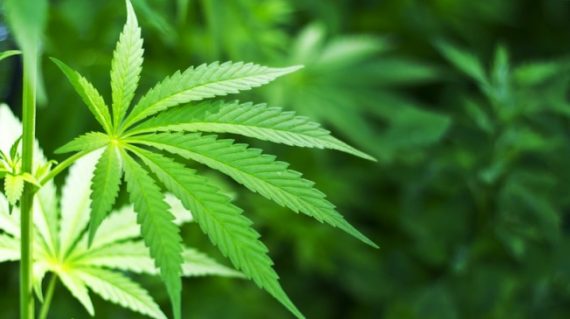

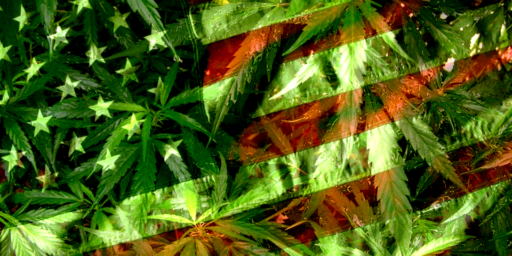
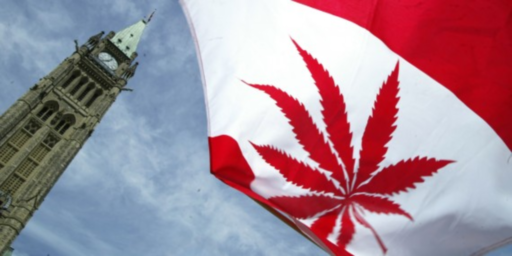
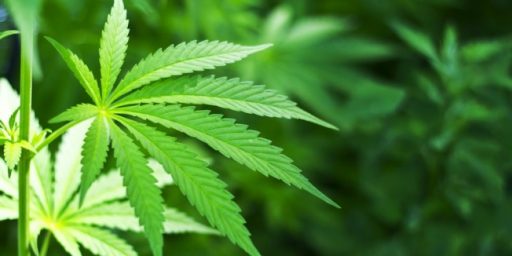
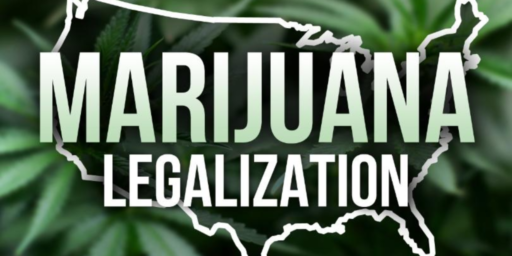
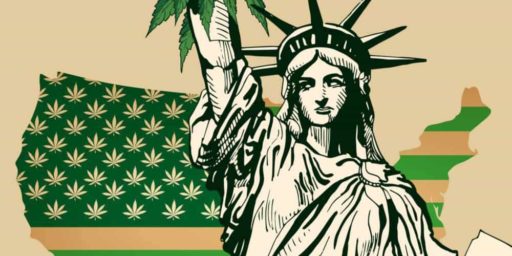
From this and many other columns, it’s clear David Brooks needs to chill out before he strokes out. He really needs to go home, put on a pair of slippers and a comfortable smoking jacket, have a glass of very expensive wine, stroke his Irish setter Moral Hazard (see Charlie Pierce), kick back in the recliner, and do a doobie.
Actually, the existing anti-smoking regulations will probably do more to put a dent in reefer smoking than all the hand-wringing of nitwits like Brooks.
As I’ve said many times, let’s legalize personal use of anything you can grow in your back yard or in a pot on the windowsill.
Gary Greenberg’s response to Brooks’ piece is really, really, really good. For a full-on stoner, anyway.
In the lovely, protected world of David Brooks, nurturing a positive moral ecology for priveleged white kids is well worth throwing hundreds of thousands of young black males in prison, stealing their youth, and then stripping away their franchise eliminating their ability to get student loans once they are freed.
And somehow, the notion of the enormous harm we do to young people who aren’t lucky enough to be white and priveleged never enters his calculation of a positive moral ecology.
I’ve never had the remotest interest in using marijuana. I stick to good single malts.
That said, when close to 50% of the prisoners in the federal prison system are there on drug charges, yet drug use and drug supply haven’t been mitigated in the least (they haven’t), it’s clearly time to reconsider the efficacy of this silly policy.
$100 says that we could devote a fraction of the resources that we currently expend on prosecution and incarceration of drug offenders to drug treatment instead, and still make much more of an impact.
@wr:
The statistics on marijuana arrests by race is stunning. Dylan Matthews at Wonkblog did a great writeup last July.
Mr Brooks’ unintentionally hilarious column (Al’s link to Gary Greenberg’s riposte was Catch of the Day) once again showcases the great gulf between the nobility and the peasantry.
Excellent post, Doug.
None of the usual arguments against marijuana hold up to ten seconds’ worth of cross-examination. Of course it’s not entirely benign. Nothing is. And yes, it would certainly be better if kids didn’t smoke it. But they do, and I did, and I’d guess something like 90% of the “creative” community has or does smoke pot.
A couple of things about marijuana:
It’s not addictive – anyone who tells you it is is lying or misinformed. I smoked it from the late 60s to the early 80s but quit when they started requiring drug tests for employment. And yes I just quit.
They have been unable to determine a lethal dose but even if there was one you would simply fall asleep before you could ingest that much.
In addition they worry about the children, it is much less harmful to their developing minds and bodies than alcohol which they don’t seem to have any trouble getting a hold of.
@grumpy realist: Did you know you can buy opium poppy (Papaver somniferum) seeds from legitimate seed stores?
Radley Balko is my go to source on the Drug War it’s consequences, tweeted this yesterday:
@HarvardLaw92:
We’ve been at loggerheads many time in past threads, but we are in agreement on this one.
I would go further and say that there are many other drugs that this calculus applies to as well. But we have to start somewhere. I hope that marijuana legalization is the “gateway drug” that this country needs to eventually end this accursed war.
@grumpy realist: I have these questions and comments. But before I begin I must admit that I have little knowledge of this and most of my experiences are related to the harmful effects of cigarettes, cigars, pipes, and chewing tobacco.
How about second hand smoke? We have heard a lot about this recently and I am now wondering why we don’t hear anything about this when it comes to these marijuana cigarettes. What about the physical effects? I have yet to hear anything from the medical profession except the potential harm of this drug. Why has the president been silent about this?
How about the domino effect of moving onto harder drugs after one becomes immune to the effects of marijuana? Should the government even be trying to encourage people to take up a habit that is done mainly to have some artificial effect on someone’s personality?
I think that the governments should be developing programs to get people to stop abusing all drugs: cigarettes, alcohol, and marijuana. The Federal government needs to start an education program aimed at children and young people. Our children need to be taught how to resist these drugs and be involved in healthy things like sports, music, camping, hunting, and the local church. There used to be government programs several years ago and I recall that they were successful and really connected to the children and youth. The last thing we need is another generation hooked on drugs.
The DC ELITES couldn’t acknowledge that the war in Afghanistan was an exercise in futility when all us peasants knew it ten years ago. Why would you expect the war on drugs to be any different? There’s way too much money to be made in continuing the fight.
Brooks certainly knew how to create a linkfest, but I don’t think his or any other pundit’s position on January 1st 2014 will matter nearly so much as the Colorado experience by 2015.
@Tyrell:
Everything you said is simply wrong. Just factually wrong.
Why do I suddenly feel the urge to take a drive to Colorado? I don’t even smoke, but the idea of legally buying something I used to sell almost 30 years ago at threat of great legal expense is all but irresistible.
@Tyrell: Pssst, the secret is to legalize then to stigmatize it´s users and tax it, like it was done with tobacco. You don´t need to ban marijuana to stop it´s use, the tobacco playbook is much more efficient.
I started smoking weed 46 years ago at the age of 20. By the time I was 25 I had snorted cocaine a few times, did many hits of acid and done a lot of speed. Also dabbled in psilocybin. Tried downers once. Never once poked a needle in my arm. No smack for me.
Drank all kinds of swill during those days too.
Just don’t know what you mean by domino effect or becoming immune to the effects of MJ.
It wasn’t easy to stop drinking but I did 16 years ago. But the worst time in my life was the several times I tried to kick the god damned cigarettes. After 30 years and choking down 3 packs a day I had to stop. Finally smoked my last one right before I quit drinking.
Today I turned 66. Went out and got a haircut and a small bag of weed. Turns out the gal that trims my dome sells grass too!
Happy Birthday to me!
Prohibition did not work. It does not work on weed. Making it illegal makes it harder to grow; import and sell. It makes it rarer and pushes up the price. The profits go to criminals instead of going to the state thru taxes and to business. It pushes some users into “the criminal justice system.” If you legalize it; you may end up with more street mopes but less criminal activity. It isn’t heroin and I believe or suspect it is comparable to beer or alcohol. Good post. I agree.
@ernieyeball: Happy Birthday!
Well, the evidence that the illegality of marijuana destroys lives is overwhelming. Any evidence that marijuana use has significant negative impacts, absent government violence is speculative.
But one could speculate that if marijuana is removed from the criminal element, there would be less risk of movement to stronger drugs by marijuana users. Alcohol being removed from the criminal element keeps drinkers from routine association with those who might wish to induce them to move to stronger substances.
Ironically, the second-hand smoke from marijuana use is more likely to have detrimental consequences to others due to the life-altering consequences of random drug testing coming up positive.
@ernieyeball: Happy Birthday to you, Happy Birthday to you, You belong in a Zoo, Happy Birthday Dear Ernie, Happy Birthday to you!
@Andre Kenji: Thanks! I’m going out for Chicken Wings and coffee later. Come on down to Sleepytown and I’ll show you good time!
As a kid getting weed was a lot easier then finding a 21.
David Brooks would be singing an entirely different tune if he had been arrested with pot. Brooksalso proves that kids will try pot and move on without it.
I’m not going to say that legalizing marijuana is all upside. Legalization will inevitably mean more use, therefore more accidents and (probably) more lung cancer. But it will mean less government violation of civil rights, especially of minorities, and less bang bang between warring gangs, so I say let’s legalize it.
Frankly, when I was a city prosecutor, after a while I just pled marijuana charges down to fines. I just saw no point to doing anything more , and neither did the judges or the police.
@OzarkHilllbilly: The version of that song I remember ended:
“You look like a monkey, and smell like one too!”
@Tyrell: Vaporizer or via food. Food is preferred by the medical community because it’s easier to dose, lasts longer, and is better at pain management.
I hung out with a lot of pot heads in junior high and highschool. I never touched pot till well after my 16th birthday. Despite being in close proximity I never really felt a “contact buzz” from second hand smoke. I’m sure that there was some effect but it was so subtle I couldn’t really notice it.
You don’t become immune to the effects of pot. You’re entering concern troll territory with that “question”.
There’s all kinds of data on the harmful and positive effects of pot. The federal government has a long history of discriminating against researchers who aren’t looking into the harmful effects of weed. The only way to legally reseach pot is by getting permision from the federal government. Also last I knew you had to use whatever strains the government was willing to let you have. THis naturally has hampered any research into the positive effects of pot usage in the USA.
Why has the president been silent about this?
Because anytime the President chimes in on something the “conservatives” reflexive action is to oppose?? I would probably prefer the President keep quiet on the subject right now.
There has been a variety of programs since the war on drugs started. You don’t remember “just say no?” how about D.A.R.E.???
Too late every generation has a large percentage of people who tried drugs of some kind.
You have a cartoonish view on drug usage in the USA..
@Andre Kenji: Nothing quite kills the coolness of something like finding out your parents do it..
@stonetools: There’s been some studies that indicate the chance of lung cancer is much lower when smoking pot then cigarettes. It doesn’t matter though as you can sidestep the whole issue by using a vaporizer or by making cannibutter.
@ernieyeball: I thought that I could see some people of OTB during the World Cup, but the US team will only play in São Paulo if they reach the semifinals. That´s not going to happen.
Also it would seem teen usage rates are falling for both alcohol and cigarettes but raising with pot. So as it is the current situation is backfiring in discouraging use among kids.
http://www.drugabuse.gov/news-events/nida-notes/2013/02/adolescent-cigarette-alcohol-use-declines-marijuana-use-rises
@Andre Kenji: Maybe you have been to the USA, I don’t know. If you get here (again?) go to San Francisco even if you’ve been there before. If I ever win the Lotto I will be back there in a heartbeat.
@Matt: Of course it is, you can’t smoke one or two packs of marijuana cigarettes a day. Most people I have known who smoke(d) pot, including me, did just enough just enough to get a gentle buzz equivalent to 2 or 3 martinis.
Oh please…we have many more states that encourage drug use–that drug being alcohol…is Brooks alarmed by that…
One would think.
Meanwhile, Tyler Cowen made a pretty astute observation, I think:
I wonder that myself, especially considering the sequence of events. Once Holder announced that the feds will leave cannabusiness alone if they follow state law, boom, here come the state laws.
@stonetools:
Sorry, bud, but I think that’s a pretty dubious idea.
Most of the pot-smokers now buying legal weed were buying illegal weed prior to Jan 1. There will be some who “try” it now that it’s legal, but really, that’s the only place you’re going to get “more use.” Otherwise, it will be “same use as always….just legal now.”
Ann Althouse has speculated on how cool it will be when the “stoners” line up behind the old Woodstockers down at the pot shop.
I thought Obama told the DEA to leave the “legal” pot shops/suppliers alone. Otherwise, they could roll up the whole enterprise in an afternoon on federal charges. Might have to bring in some more federal agents but otherwise, even in Colorado, marijuana is still a controlled substance. Actually it was instructions to the Federal Prosecutors
Autocorrect: REEFER, not Refer.
@JKB:
We’ve often disagreed, quite vociferously, but when you’re right, you’re right.
@JKB: I had requested that post be deleted because frankly it doesn’t matter as much for some of the kids.
@JKB:
The raids would take an afternoon. The prosecutions would take years.
No one in the Obama administration is going to do that anyway. His supporters would be pissed and his detractors would not give him any credit.
@James Pearce:
My point was that Obama had taken a position. Downside is that the whole states legalizing pot is at big risk come January 2017. Republican or Democrat, for a while, no one will know whether the feds will shut it down. Best plan would be to push legislation that effectively removed the state controlled production and distribution from the federal purview.
@JKB:
If there’s only 2, sure, but I expect by 2017 there will be a couple more states that pass legalization laws. If so, it’s going to be a lot trickier for the feds to dismantle it with DEA raids.
At this point, I’m going to assume that neither contender in 2016, Democrat or Republican, will be cleanly pro-pot, but I do think that one will be less hostile to the idea than the other. I’m going to go out on a limb and predict that it will be the “small government/state’s rights” candidate who will be in favor of keeping it under federal purview.
Interesting bit from this report:
Notice something about the geography? The only red states in this list are in the Mountain West and the Pacific Coast. Nothing from the Midwest. Nothing from the South.
Conclusion: Marijuana legalization is mostly a liberal project. And to the extent that it is, I think opposition in some of the less liberal areas of the country will actually harden. The GOP candidate will no doubt reflect that.
@Ron Beasley: At last, the answer to the whole cancer cannard. It should be noted that cancer rates did not start to rise in the US until Lorrilard or Duke or whoever it was invented the cigarette rolling machine–which raised smoking rates from one or two a day to 20 or 30 or more a day over the course of a few generations. Even at that, it was 40 years later that cancer became something other than an anomaly.
Thank you!
Amen to that. I have an addictive personality, and the list of things I have been addicted to is a long one. When I was 19, I got tired of pot after being stoned more or less constantly for five years. I just stopped.
I know what addictive is – pot use may become habitual, but it is no way addictive. People who say it is are, indeed, lying or misinformed.
Dare is about fundraising and cushy gigs for cops. Nothing else. Beyond that it is a joke.
Jesus, where do you get this crap? Roughly 8-10% of the human race are natural born addicts. Always have been, always will be barring a huge medical breakthrough. Our only choice is do we deal with this unpleasant fact of life intelligently, or not. Tell you one thing, feel good school programs and bible thumping are not going to change a damn thing.
@anjin-san: I know that I and everyone else in my school took D.A.R.E. very seriously!!!
*snort*
HAHAHAHHAHA no..
Yeah it worked about as well as the “this is your brain on…” crap.
About that second-hand smoke thing. Technically, we’re talking about what used to be called a “contact high”. In one of the chapters of my misspent youth, I often found myself in smoke-filled rooms, dope smoke, hash smoke, strangely (or maybe not) no cigarette smoke (“That shit’ll kill you”). Nothing. I suppose the closest I ever came to the mythical contact high was one summer day in 1970, I think it was. About five or six hundred people had gathered on Cambridge Common for the purpose of levitating the Common. Much drumming, dancing, OMing. Much smoking. Sadly, neither the Common nor I were levitated. Bummer.
@An Interested Party:
Hell, there are states that actually own the liquor stores. And they make enough money selling booze that any push to privatize those stores fails because it would cost the state too much revenue.
@Mikey: Sounds like the state-run likker stores need to belly up to the bar and stock weed.
@James Pearce:
Wonderful. Now our blue/red, urban/rural, northern/southern split will be hardened by a squirrel/meth head split.
Here’s a tune that Brooks and his buddies can sing along with:
http://www.youtube.com/watch?v=SMoSf8_TyZc
@gVOR08:
I was thinking Green and Red states.
@Ron Beasley: Which is why you don’t eat anything with poppy seeds on them three weeks before a drug test because it will come out with a positive.
Opium poppies are large and showy and absolutely impossible to get out of the garden because the damn seeds keep sprouting for years afterwards. It took us five years.
@sam: I’d simply prefer reefers to cigarettes being smoked around me because I’m far less allergic to reefer smoke. Tobacco smoke makes me nauseated in a way that pot smoke never does.
@michael reynolds:
He actually had one thing right when he said,
@James Pearce:
Red eyed green states